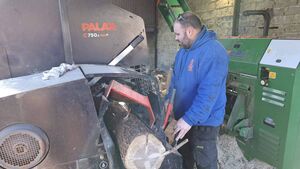Firewood vendor wants crackdown on 'cowboys'

Patrick Flanagan, founder and owner of PJF Firewood, in his workshop at Carrowbehy, Ballyhaunis.
A firewood processor near Ballyhaunis is angry that local authorities don’t clamp down on unlicensed vendors of timber who sell products that don’t meet national standards.
Patrick Flanagan, founder and owner of PJF Firewood in Carrowbehy, pulls out his phone to show me adverts on Facebook Marketplace for timber vendors in Ballyhaunis and Claremorris. The vendor’s names suggest they’re hiding behind fake personas.
“I pay €6,000 for insurance, €1,000 a year for my certification, I pay PAYE and PRSI for my employees but it’s me the council comes and inspects, not these cowboys.”
The phone has been hopping at PJF Firewood since Storm Éowyn, which felled more trees than any storm in living memory.
“People want me to come and take away trees but we can’t,” explains Flanagan who operates the business near his home on the Mayo-Roscommon border.
PJ Firewood is a licensed operator so it cannot buy random supplies from tree surgeons, for instance, “because we wouldn’t be able to certify it, and there has to be a felling license for the timber we use". Flanagan buys his timber from forestry companies and processes it in line with government regulations which aim to reduce the pollution from solid fuels like smoky coal and moist timber.
“Most of our timber is coming from Dunmore, Ballaghaderreen and Dowra," he explains, adding that these suppliers want to provide a minimum of 10 articulated truckloads at a time. These licensed operators also provide Flanagan with the paperwork he needs for his own certification: he’s licensed by the Environmental Protection Authority and is a member of Wood Fuels Quality Assurance scheme.
Certification reassures his clients - the shops - that the wood meets national standards on solid fuel. Under government legislation, retailers are prevented from selling firewood with a moisture content above 20%.
A more commercial reason for why he can’t take the timber is because he has several large stacks of logs cut to a uniform 1.5 metres and ready to be dropped through a series of automated processes that produce bagged, kiln-dried pieces of softwood timber ready for delivery to a network of shops across Mayo and Roscommon.
While Flanagan received grant support from the LEADER rural funding programme to set up his business, he’s also seeking government assistance now to adapt to the changing climate.
Stormier weather has created demand for Flanagan’s timber: the aftermath of the most recent storm was a particularly busy time as locals in cold, dark houses turned to solid fuel.
However, wetter weather – like storms that are a product of climate change – makes it harder to dry the timber he’s selling.
“You might have 10,000 tons drying for 18 months and it’s still not dry.”
That’s why he wants the Government to subsidise drying costs for operators like him. Otherwise, he believes, businesses like his will close and the public will revert to burning dirtier fuel like coal – or wet timber from unlicensed operators.
Another worry is that the storm will further increase the cost of timber he buys. The cost of a log has risen by 50% in the past two years due to higher felling costs - diesel and higher wages – but clearing wind-blown timber and forests that have pockets of felled trees will be more expensive, Flanagan fears.
“It probably will but we won’t know till next year," he says.
Flanagan, aged 35, operates a kiln at his premises, a yard overlooking Cloonagh Lake which hums with front loaders and machines that split, chop and splinter logs into firewood and kindling.
The drying process happens in a shipping container, loaded with cages of chopped timber, through which the warm air is circulated. Sauna-like temperatures and a sweet, warm smell of drying timber fill the air when Flanagan opens the container. The kiln furnace is fired on waste cuttings and oversized logs. Sawdust meanwhile is bagged separately as a saleable by-product sought by horse farms.
The productivity of the Carrowbehy yard is expanding Flanagan’s customer base. The company has gone from seven to 14 shops in the past year.
“We advertise less. It’s all word of mouth now. Retailers want a steady supply... they want someone reliable with a steady supply and high standards, someone who’s going to be there in a month’s time.”
With peat briquettes gone from the market, customers switch from sawdust and willow briquettes because there’s a lot of ash from them.
Now a decade in business, PJF remains in expansion mode. Flanagan plans to extend his kiln drying facility in order to dry higher volumes of timber while he’s also seeking to replace his kindling machine – it turns out 800 bags of kindling on an eight-hour shift – with a larger machine from the supplier in Scotland who’s supplied most of his equipment.





